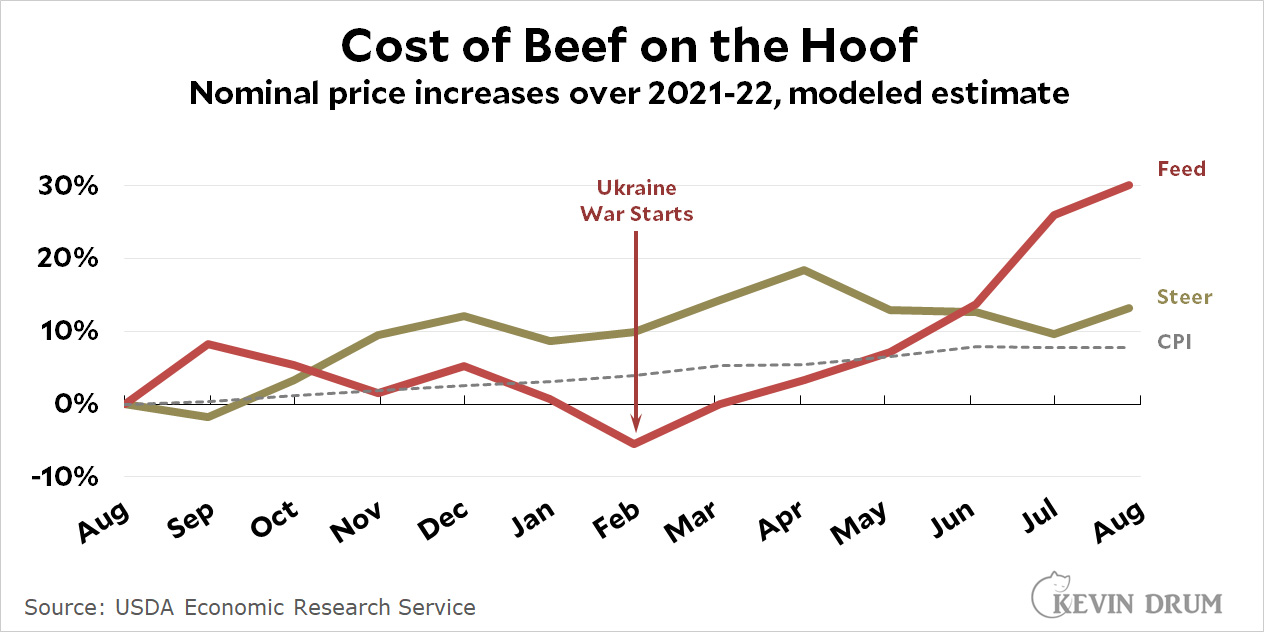I was noodling around some stuff this afternoon and happened to end up at the USDA website. Today they released their monthly meat report, and it gives you a pretty good idea of why hamburger is more expensive than it was last year:
 The price of a 750 lb feeder steer has gone up 13%. The price of feed has gone up 30%. As you can see from the chart, these increases have far outpaced the rate of inflation (calculated as CPI excluding food).¹
The price of a 750 lb feeder steer has gone up 13%. The price of feed has gone up 30%. As you can see from the chart, these increases have far outpaced the rate of inflation (calculated as CPI excluding food).¹
Altogether, the total expense of raising a steer for market has gone up from $1,600 to $1,900 over the past year. That's an increase of 19%.
This is why everyone is unhappy. The price of hamburger has gone up about 10% over the past year, so shoppers are unhappy. But that increase doesn't cover the price of producing the hamburger, which has gone up 19%, so ranchers are unhappy. The Ukrainians have been invaded by Russia, so they aren't happy. And the Russians are losing, so they aren't happy either. That's a lot of unhappy.
¹All prices are nominal and are based on the USDA's High Plains Cattle Feeding Simulator.

So what you're saying is, consumers should pay Putin 10% of the cost of a hamburger, Putin should spend the money on grain, and farmers should date Ukrainians, right?
Part of the problem is a prolonged drought in the high plains which leads to a shortage of feed, and thus higher prices.
PBS had a great show on a while ago. I was about the beef industry, specifically consolidation in the meat packing industry. There are still auctions, but now most (?) animals are being raised under contract. The auction prices are not what most farmers get. It seems akin to what happened to the chicken farmers.
As for working as a "meat packer":
https://www.theatlantic.com/magazine/archive/2021/07/meatpacking-plant-dodge-city/619011/
And projected costs of feed will be up next year too--getting back up to 2012 levels.
https://www.beefmagazine.com/beef/higher-inputs-costs-and-feed-costs-face-producers
Consolidation in farm product processing (beef, chickens, dairy) is a major problem that democrats should look at. Just about every farmer I know complains about the current system.
Two things. First, feed is not the only cost in raising beef cattle.
Second, and more important, the timing is badly off. The price of beef spiked drastically in the 18 months before this chart starts, coincident with the rise of covid. Further, on this chart the price of beef rises from September to December 2021 but the price of feed doesn't start to rise until February 2022. If there was a cause-and-effect relationship, it would appear that increasing the price of beef causes the price of feed to rise, which is just silly. I'm forced to conclude that the price of beef and the price of feed are not strongly correlated, even with a reasonable lag figured in.
The local farm that's been our source for turkeys tells us that they aren't raising them anymore. The combination of increased feed and other costs has priced them out of the market. They're likely not the only ones so I'm expecting more widespread unhappiness here around Thanksgiving.
Apropos of nothing, I'm surprised that beef still holds its cherished role in the American diet. Doctors and dieticians constantly warn of its high levels of saturated fats. It's increasingly expensive. And, not that Americans would care, its "production" is very hard on the environment and "feed" is a waste of food that people could be eating.
Why hasn't there been a bigger move towards poultry, a more efficient, less unhealthy kind of animal protein? (No, I'm not going to address vegetarians and vegans. I leave that for others.)
Consumption of chicken has increased over the recent decades as well as a decline in beef consumption but not as much as dieticians would like to happen.
There is a lot of chicken sold because it's cheep, but people still like beef.
So is it consensus that the feed cost increase is mostly driven by Ukrainian grain production/distribution?
You're paying Putin's price at the grocery store, that's why conservatives think he's a genius.
I suspect that the steers aren't happy either!